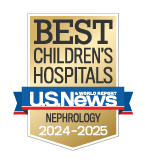Kidney Transplant
Nationally ranked by U.S. News & World Report

The Children's Mercy kidney transplant program complements the nationally recognized pediatric dialysis program and is a key component of the Division of Nephrology, which ranks as one of the top programs in the country by U. S. News and World Report.
Our multidisciplinary team works with referring physicians before and after a transplant to ensure effective continuity of care for pediatric transplant recipients and their families. We have established an outstanding national reputation for patient care and outcomes.
Kidney failure
Having kidney failure means that your kidneys are not working well enough to keep you healthy. End-stage kidney disease (ESKD) is also sometimes called kidney failure.
Causes of kidney failure in children:
- Infections
- Congenital conditions (abnormalities of the kidneys you are born with)
- Genetic conditions (abnormalities of the kidneys that you inherit)
- Autoimmune diseases
- High blood pressure
- Medication
- Traumatic injury to the kidney
- Inflammation
- Kidney blockage
- Unknown reasons
Treatment of kidney failure
There is no for cure for kidney failure, but there is treatment:
- Dialysis
- Hemodialysis (HD)
- Peritoneal dialysis (PD)
- Diet
- Medications
- Kidney Transplant
- Living donation
- Deceased donation
A kidney transplant is a treatment for kidney failure. It is not a cure.
- A kidney transplant requires a surgery in which a person with kidney failure gets one new, healthy kidney from a donor.
- There are two types of kidney transplant donors:
- Living donor = Person voluntarily donates kidney to recipient.
- Deceased donor = Donor has died, and family approves donation of loved one’s kidneys.
- You/your child can live a healthy life with just one kidney.
- On average, a kidney transplant will last about 15 years.
- You/your child will need to take transplant medications for as long as the kidney is working.
- You/your child will likely need more than one transplant in his/her lifetime.
The Kidney Transplant Team
For a transplant to be successful, many people work together. The most important members of the Kidney Transplant Team are you/you as a parent and your children. The members of the transplant team are listed below. Many others work with the team as well, such as urologists, transplant unit nurses (5 Sutherland Tower and Intensive Care), clinic nurses in the Kidney Center and dialysis nurses. Your transplant team wants you to be involved as much as possible in your/your child’s care. It is important for you to ask the team any questions you may have and to report any changes in how you/your child is feeling before and after the transplant.
- Nephrologists (kidney doctors)
- Nurse practitioners
- Dialysis nurses
- Dialysis technicians
- Transport coordinators
- Psychologists
- Social workers
- Dieticians
- Financial coordinators
- Child life specialists
- Pharmacists
- Chaplains
- Hospital-based school teachers
Nationally ranked by U.S. News & World Report
Nationally ranked by U.S. News & World Report
When your child comes to Children's Mercy for care, they're getting a nationally recognized team of experts and an entire system of support.
-
Multidisciplinary transplant team including pediatric specialists in nephrology, transplant surgery, urology and anesthesiology.
-
Availability of transplant coordinator, physician and surgeon 24 hours per day, seven days a week
-
Pharmacokinetic modeling of immunosuppressive medications.
-
Laparoscopic kidney donation.
-
Opportunity to participate in research protocols of new therapies for transplant recipients.
-
Transition program for transplant recipients.
-
Medically-supervised summer camp experience for dialysis and transplant patients.
-
Ronald McDonald House or the Ronald McDonald Family Room accommodations for patient families.
Inside Pediatrics: Jack's story
Two-year-old Jack needs daily dialysis, care from the region’s top pediatric nephrologists and a kidney transplant to survive. While some kids wait months for a kidney, Jack already has a donor: his dad.
A better quality of life: Hayden's story
Hayden Murnahan defied the odds when he received a long-distance kidney donation via private plane for a second transplant.

Kidney transplant: Isaac's and Colin's stories
Isaac Schroeder, a 2 ½-year-old patient from Omaha, Neb., and his mother celebrate the one-year anniversary of Isaac’s lifesaving kidney transplant at Children’s Mercy. Meanwhile 18-year-old Colin Martin recovers from a kidney transplant made possible by his brother, William. This was the first brother-to-brother transplant performed at Children’s Mercy, and both young men are doing well.
Advancing kidney transplant care through research
Members of the Children's Mercy Kidney Transplant Team take part in local, regional and national research that aims to find innovative treatments for children who have kidney failure.
-
Evaluation of immunosuppressive dosing regimens as part of our quality improvement activities has resulted in modification of medication administration schedules and more prompt achievement of therapeutic drug levels.
-
We are working with colleagues in the Center for Personalized Medicine and Therapeutic Innovation to explore the influence of genomic-based variations in patient drug metabolism characteristics on individualized treatment regimens.
-
Our program is a regular participant in national industry-sponsored pharmaceutical studies. Current protocols are addressing the use of erythropoietic stimulating agents, vitamin D and anti-viral agents in transplant recipients.
-
We are one of a select group of pediatric transplant programs in the country participating in a study sponsored by the National Institutes of Health of antihypertensive therapy in pediatric transplant patients.
-
The transplant, dialysis and general nephrology programs are active members of the North American Pediatric Renal Trials and Collaborative Studies (NAPRTCS). Activities include data entry into the transplant, dialysis and chronic kidney disease registries, participation in the benchmarking project, and frequent patient entry into prospective clinical trials.
Visit the Donate Life organization to learn more about organ donation, registration, news, and events.